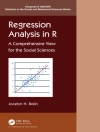This new study assesses the welfare state to ask key questions and draw new conclusions about its place in modern society.It shows how the welfare states that we have inherited from the early post-war years had one main objective: to protect the income of the male breadwinner. Today, however, massive social change, in particular the shift from industrial to post-industrial societies and economies, have resulted in new demands being put on welfare states. These demands originate from situations that are typical of the new family and labour market structures that have become widespread in western countries since the 1970s and 1980s, characterised by the clear prevalence of service employment and by the massive entry of women in the labour market.Against this background, this book: * presents a precise and clear definition of ‘new social risks’. A concept being increasingly used in welfare state literature. * focuses on the groups that are mostly exposed to new social risks (women, the young, the low-skilled) in order to study their political behaviour. * assesses policymaking processes that can lead to successful adaptation. It covers key areas such as child care, care for elderly people, adapting pensions to atypical career patterns, active labour market policies, and policy making at the EU level. This book will be of great interest for all students and scholars of politics, sociology and the welfare state in particular.
Klaus Armingeon & Giuliano Bonoli
Politics of Post-Industrial Welfare States [PDF ebook]
Adapting Post-War Social Policies to New Social Risks
Politics of Post-Industrial Welfare States [PDF ebook]
Adapting Post-War Social Policies to New Social Risks
购买此电子书可免费获赠一本!
语言 英语 ● 格式 PDF ● 网页 272 ● ISBN 9781134179107 ● 编辑 Klaus Armingeon & Giuliano Bonoli ● 出版者 Taylor and Francis ● 发布时间 2007 ● 下载 3 时 ● 货币 EUR ● ID 4121418 ● 复制保护 Adobe DRM
需要具备DRM功能的电子书阅读器












